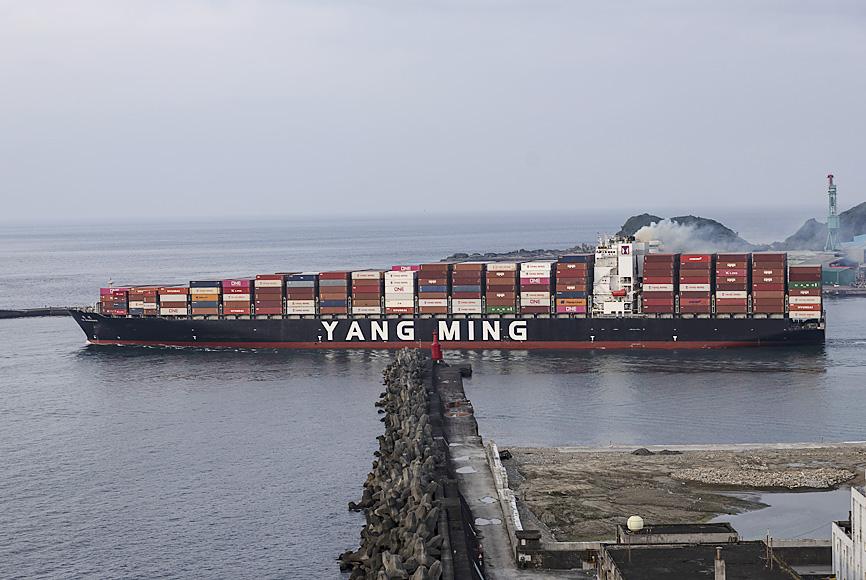The US and Japan replaced China as the largest buyers of Taiwanese agricultural goods in the first half of this year, the Council of Agriculture said on Tuesday as is spoke of its market diversification strategy.
The three largest buyers of Taiwanese agricultural products were the US, Japan and China between January and last month, which respectively accounted for 18.6 percent, 16.4 percent and 13.7 percent of the exported goods, the council said.
Taiwan exported 948,000 tonnes of agricultural goods in the first six months of this year, 13.6 percent less than the 1,0970,000 tonnes in the same period last year, the council said.

Photo: CNA
The value of agricultural exports in the first half was NT$2.62 billion (US$87.58 million), 5.5 percent less than NT$277 billion in the same period last year.
Exports with the most significant growth in the US market were fruit, fruit juices, tea, cassava starch, pastries and snacks, with export volumes increasing by up to 40 percent, it said.
The overall drop in exports was the result of climate-related instabilities in production, said Lin Chih-hung (林志鴻), deputy director-general of the council’s Department of International Affairs.
The high costs of global shipping caused by the COVID-19 pandemic accounted for the remainder of the decline, he said.
China’s bans on Taiwanese fruit and farm-raised fish damaged local sectors that had long relied on China as their most important overseas buyer, Lin said, adding that the council remains optimistic that it can find alternative markets in the second half of the year.
Formerly Taiwan’s largest agricultural trade partner, China accounted for more than 20 percent of the sector’s exports from 2015 to last year.
The pattern changed in the first half of this year as China’s share of Taiwan’s fruit exports plummeted from 84 percent to 1.8 percent amid concerns about risks in its market.
Taiwan is gradually weaning itself off the Chinese market, a move largely motivated by the high levels of uncertainty created by Beijing, said Roy Chun Lee (李淳), senior deputy CEO of the Taiwan WTO & RTA Center at the Chung-Hua Institution for Economic Research.
Taiwan’s growth in exports to the US, Japan and Europe is beneficial to the development of Taiwan’s agricultural sector, and helps avoid political risks, he said.

A small number of Taiwanese this year lost their citizenship rights after traveling in China and obtaining a one-time Chinese passport to cross the border into Russia, a source said today. The people signed up through Chinese travel agencies for tours of neighboring Russia with companies claiming they could obtain Russian visas and fast-track border clearance, the source said on condition of anonymity. The travelers were actually issued one-time-use Chinese passports, they said. Taiwanese are prohibited from holding a Chinese passport or household registration. If found to have a Chinese ID, they may lose their resident status under Article 9-1

Taiwanese were praised for their composure after a video filmed by Taiwanese tourists capturing the moment a magnitude 7.5 earthquake struck Japan’s Aomori Prefecture went viral on social media. The video shows a hotel room shaking violently amid Monday’s quake, with objects falling to the ground. Two Taiwanese began filming with their mobile phones, while two others held the sides of a TV to prevent it from falling. When the shaking stopped, the pair calmly took down the TV and laid it flat on a tatami mat, the video shows. The video also captured the group talking about the safety of their companions bathing

PROBLEMATIC APP: Citing more than 1,000 fraud cases, the government is taking the app down for a year, but opposition voices are calling it censorship Chinese Nationalist Party (KMT) Chairwoman Cheng Li-wun (鄭麗文) yesterday decried a government plan to suspend access to Chinese social media platform Xiaohongshu (小紅書) for one year as censorship, while the Presidential Office backed the plan. The Ministry of the Interior on Thursday cited security risks and accusations that the Instagram-like app, known as Rednote in English, had figured in more than 1,700 fraud cases since last year. The company, which has about 3 million users in Taiwan, has not yet responded to requests for comment. “Many people online are already asking ‘How to climb over the firewall to access Xiaohongshu,’” Cheng posted on

A classified Pentagon-produced, multiyear assessment — the Overmatch brief — highlighted unreported Chinese capabilities to destroy US military assets and identified US supply chain choke points, painting a disturbing picture of waning US military might, a New York Times editorial published on Monday said. US Secretary of Defense Pete Hegseth’s comments in November last year that “we lose every time” in Pentagon-conducted war games pitting the US against China further highlighted the uncertainty about the US’ capability to intervene in the event of a Chinese invasion of Taiwan. “It shows the Pentagon’s overreliance on expensive, vulnerable weapons as adversaries field cheap, technologically